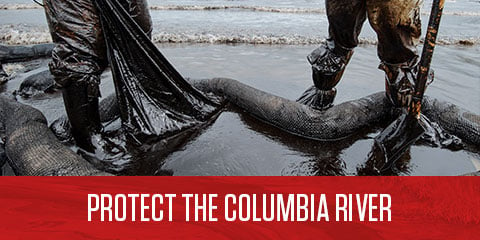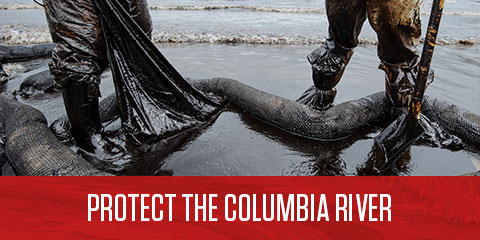
While the Keystone XL pipeline and drilling the Artic grew to be favorite topics for politicians on both sides of the aisle and the rallying cries for the environmental community, seemingly the only two poster children climate change in the national spotlight, a behemoth has been quietly extending it’s tendrils through the temperate rain forests and communities of the Pacific Northwest. Crude oil export. It’s not one single project that begs for a call to arms, but a series of them that stands to dwarf the impact of Keystone XL, both in climate footprint and potential for social and environmental catastrophe.
Currently there are 15 crude-by-rail export terminals (8 of which are already operating) that, if approved and fully operational, could have the capacity to move over 1,019,000 barrels of oil (or 42,798,000 gallons) per day to ports along the Washington and Oregon and coastlines and rivers. This is 23 percent more volume than the capacity of the Keystone XL pipeline, and perhaps more importantly, via a transportation method that is much more susceptible to accidents and spills than moving crude by pipeline. The frequent high winds that make the Columbia River a mecca for windsurfers and kiteboarders and the pumping surf on PNW coastline that will humble all who enter make for a disastrous set of conditions for containment and cleanup of any kind of spill. There is nothing any corporation, agency or environmental group can do if it’s blowing 50+ knots or there is 40+ foot surf but sit back and watch the devastation.
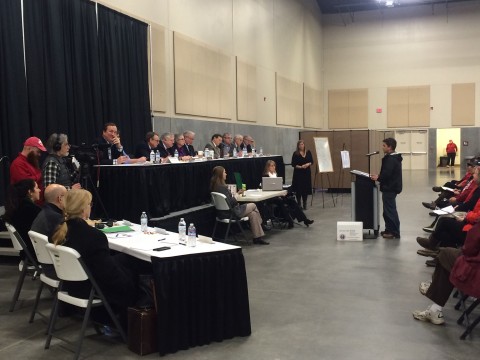 Oregon Field Coordinator Ryan Cruse testifying in opposition of the proposed Tesoro Savage crude export terminal at the WA Energy Facilities Site Evaluation Council (EFSEC) public hearing in January, 2016.
Oregon Field Coordinator Ryan Cruse testifying in opposition of the proposed Tesoro Savage crude export terminal at the WA Energy Facilities Site Evaluation Council (EFSEC) public hearing in January, 2016.
Surfrider activists in Washington and Oregon have thrown their weight behind stopping two of these projects in particular, the Westway export expansion project in Grays Harbor, WA and the Tesoro Savage Export Terminal in Vancouver, WA (The largest oil terminal in North America, directly across the Columbia River from Portland, OR and considered part of the Portland Metro Area). Together these proposed projects, if approved, would move approximately 150 million barrels of crude by rail per year and then onto ocean going vessels through some of the most precious recreation areas in Washington and Oregon. Hundreds of Surfrider activists from across both states have sent of letters to the state agencies leading these environmental reviews, singed petitions, attended rallies and provided public testimony - all with one unified message: Not The Answer. For the recent Vancouver public comment period, along with our coalition partners, we helped to submit 279,000 comments, the most ever received by the Washington Energy Facility Site Evaluation Council. There are safer and more efficient methods for transporting petroleum products across our lands and waterways. Furthermore we should be building the foundation for a clean, renewable energy economy, not allowing big oil to expand operations for short-term gains that place serious long-term risks on our environment and quality of life.
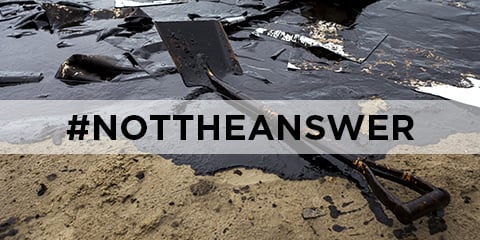
Not only are these two proposed projects located in recreation hotspots for all the surfers, SUPers, kayakers, fishermen, birders and beach goers who use them, but they have the potential to negatively affect a major economic force in the PNW. In 2011, the Surfrider Foundation, published a study on non-consumptive recreation along the Oregon Coast, which provides an economic and spatial baseline of the various uses on the Columbia River Estuary and along the northern coast of Oregon. This study found that Oregon residents took an estimated 27 million trips to the Oregon coast; with over 80% stating the primary purpose was for recreation. Average respondents spent approximately $87.72 per trip, translating to an estimated $2.4 billion in direct trip expenditures. A similar study was conducted in Washington in 2014, demonstrating that Washington residents took an estimated 4.1 million trips to the Washington coast, with nearly 60% saying the primary purpose was for recreation. Average respondents spent approximately $111.14 per trip, translating to an estimated $481 million in direct trip expenditures Together, these studies demonstrate values much higher than the positive socioeconomic impacts of both construction ($129.3 million revenue total) and annual operation ($130.4 million annually) of the proposed terminal in Vancouver.
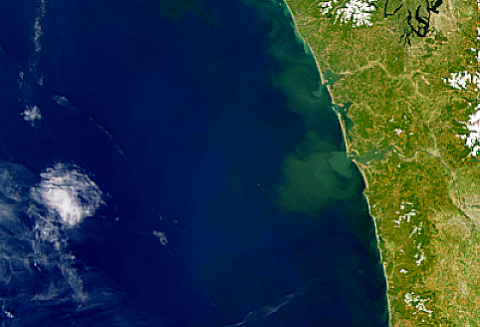 Grays Harbor and Columbia River plumes - imagine if there was an oil spill upstream...
Grays Harbor and Columbia River plumes - imagine if there was an oil spill upstream...
While many of these projects were originally billed as supporting energy independence, shipping crude from the interior of the US & Canada (Bakken region of North Dakota and Canadian tar sands oil),to refineries along the West Coast, they could just as easily serve foreign markets, a bait and switch that the oil industry has pulled in the past. Is it really a coincidence that the 40-year ban on domestic crude oil export was recently lifted with heavy lobbying from slippery big oil?
Building a massive crude oil export network through some of the most beautiful and harsh environments in our country is an extremely risky proposition at best. Rail accidents resulting in a spill are expected to occur, on average, every two years. Vessel spills from groundings or collisions are expected every twenty. If that doesn’t get us, the fact that both of these facilities are either located directly in the tsunami zone or on unstable soils subject to liquefaction when the next Cascadia subduction earthquake happens most certainly will. Join us as part of the “thin green line” in standing up for the health of our communities, helping elevate awareness to the national level and protecting this special place we call Cascadia.
By: Ryan Cruse, Oregon Field Coordinator & Gus Gates, Washington Policy Manager

